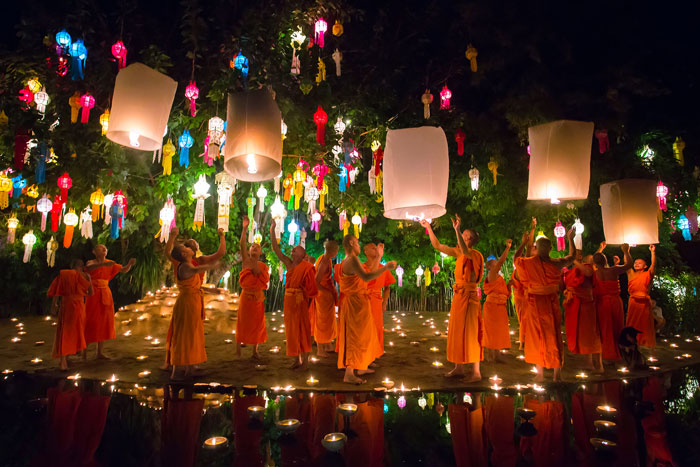Buddhist Holidays

Various traditions developed as Buddhism spread across Asia, including:
- The Way of the Elders (Theravada) in India, Sri Lanka, Burma, Laos, Thailand.
- The Great Vehicle (Mahayana) in China, Japan, Vietnam, Tibet, Nepal, and Bhutan.
The Great Vehicle includes Zen, Pure Land, Vajrayana, and other schools.
A range of holidays developed as Buddhism adapted to existing religions (Confucian, Taoist, shamanic, etc) and cultural ceremonies (birth, marriage, death, harvest, new year).
Buddhist traditions and holidays are also adapting to life and culture in the West. For instance, the original three-month rains retreat in India took place during the summer monsoons, but some Western Buddhists observe the rains retreat in the winter.
Major rituals and holidays in various Buddhist cultures are listed below. Dates are not exact when holidays are observed according to the lunar calendar.
Bodhi Day: anniversary of Buddha Shayamuni’s birth, enlightenment, and/or death.
January/February
New year celebrations (spring festivals) in China, Japan, Korea, Vietnam, and other countries.
January/February
Nirvana Day ceremony in China and Japan marking the Buddha’s death at the age of 80.
February/March
Sangha Day celebrating the monastic community by Buddhists in Thailand, Cambodia, Sri Lanka and Laos on the full moon day of the third lunar month. In China there is a corresponding lantern festival (Shangyuan) festival, and Tibetans observe the new year (Losar) and a butter lamp ceremony (Chotrul Duchen).
April
Thai new year water festival (Songkran); buddha statues are bathed and then children are blessed with the purified water.
May
Vesak (or Wesak) festival in the Theravada tradition, celebrating the Buddha’s birth, enlightenment, and death.
July
Rains Retreat (Vassa or Wassana) in the Theravada tradition, a three-month retreat beginning on the day observing the Buddha’s first teaching “setting the Dharma wheel in motion.” The retreat ends in early October with a Pavarana ceremony, followed by Kathina ceremony when lay followers donate new robes to the monastics who have been in retreat for three months.
July
Hungry Ghost ceremonies and festivals honoring family ancestors in China (Ullambana), Japan (Segaki/Bon Odori), Vietnam (Vu Lan), etc.
October
Ceremonies marking the end of the three-month rains retreat in the Theravada tradition.
December
Bodhi (Enlightenment) Day in the Zen tradition, often observed with a week-long meditation retreat the first week of December.
More information can be found at the Wikipedia pages for Buddhist Holidays – and – Buddhist Festivals.

